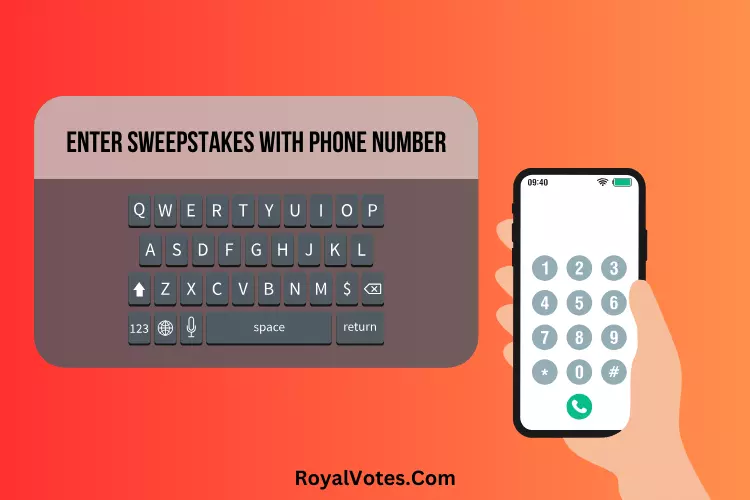Whether or not you should enter sweepstakes with phone number depends on the legitimacy of the sweepstakes. If a company has a good track record and runs sweepstakes annually, it may be safe to provide your number. However, be cautious, as fake sweepstakes could misuse your number by selling it to telemarketers and spammers, leading to unnecessary annoyance.
In this blog, I will discuss 11 cautions before entering a sweepstakes with a phone number. But first, I will tell you the advantages and disadvantages of giving your phone number while entering sweepstakes.

Advantages of Providing Your Phone Number to ENTER Sweepstakes
Here are all the advantages of giving your phone number to enter sweepstakes-
Quick Notification
One of the primary advantages of providing your phone number while entering sweepstakes is the quick notification. Companies use text messages or phone calls to inform winners significantly faster than traditional mail or email. This lets you claim your prize promptly and reduces the chance of missing out due to delayed notification.
Read also: How do you know if you really won a sweepstakes?
Direct Communication
Your phone number allows the sweepstakes organizers to establish direct communication with you. In the event of any queries or clarifications regarding the sweepstakes rules or your entries, they can reach you directly, ensuring that the process runs smoothly and increasing your chances of winning.
Real-Time Updates
Providing your phone number can also enable you to receive real-time updates about the sweepstakes. Many companies offer text updates about the status of the competition, including announcements of winners, reminders of upcoming sweepstakes, and alerts about any changes in the rules or prizes. This can help keep you engaged and informed, enhancing your sweepstakes experience.
Verification of Identity
Lastly, your phone number can serve as a means of verifying your identity. This can be particularly important in high-stakes sweepstakes where organizers must ensure the validity and honesty of the entries. By providing your phone number, you add an extra layer of authenticity to your entry, potentially increasing your likelihood of being selected as a winner.
Disadvantages of giving a phone number to enter sweepstakes
Apart from all the disadvantages there are some major drawbacks of giving your phone number while entering sweepstakes. Some of the prominent ones are:
Increased Spam
One of the primary disadvantages of providing your phone number while entering sweepstakes is the potential increase in spam calls and messages. Some sweepstakes organizers may not have strict data privacy policies and may sell or distribute your number to third parties such as telemarketers. This could significantly increase unsolicited calls and messages, causing annoyance and potential invasion of your privacy.
Identity Theft Risk
Your phone number can serve as a piece of identifying information, and when it falls into the wrong hands, it could be used for identity theft. Fraudsters may use your number to impersonate you, gain access to your accounts, or accumulate debt in your name. This risk is further heightened if the sweepstakes organizers do not have robust data security measures.
Financial Scams
Providing your phone number to enter sweepstakes can open you up to financial scams. Some illegitimate sweepstakes may claim you’ve won a prize and then request a ‘processing fee’ or ‘tax payment’ to claim it. These scams can be particularly convincing when they have your phone number and can contact you directly.
Interruptions and Disturbances
Lastly, providing your phone number can lead to unwanted interruptions and disturbances. You may receive calls or texts at inconvenient times, such as early mornings, late nights, or during work hours. These frequent interruptions can be disruptive and frustrating.
Read also: Do people actually win sweepstakes?
11 Cautions to Take Before Entering Sweepstakes With Phone Number
Now that I have discussed the advantages and disadvantages of giving your phone number while entering sweepstakes, let’s move on to the 11 cautions you should take before providing your number. These cautions can help protect your privacy, minimize spam and fraud risks, and ensure a positive sweepstakes experience.
Caution 1: Verify the Legitimacy of the Sweepstakes
One of the first steps you should take before entering a sweepstakes with your phone number is to verify the legitimacy of the sweepstakes. Research the company running the sweepstakes to ensure they have a solid reputation.
Look for reviews or testimonials from previous participants and check mainstream media for any mentions of the sweepstakes. You should also verify the sweepstakes through third-party sweepstakes directories or forums.
For instance, if XYZ Company is running the sweepstakes, and they have been around for years with plenty of positive reviews and no reports of scams, you can feel more confident about their legitimacy. Conversely, if you find negative reviews or scam warnings about the company, it would be wise to avoid entering their sweepstakes, especially with your phone number.
Caution 2: Read the Privacy Policy
Before you provide your phone number to enter a sweepstakes, it is essential to read the privacy policy of the company organizing the event. A company’s privacy policy should clearly state how they collect, use, protect, and disclose your personal information, including your phone number.
For instance, let’s consider XYZ Company’s sweepstakes. Before entering, you should look for their privacy policy, typically at the bottom of their official website or the sweepstakes entry form. If the policy states that XYZ Company does not sell or share your personal information with third parties, you can feel more secure about entering the sweepstakes.
However, if the policy is ambiguous or states that your information may be shared or sold, you may want to reconsider entering the sweepstakes with your phone number. Understanding the privacy policy can protect you from unsolicited calls, messages, and scams.
Caution 3: Beware of Unsolicited Sweepstakes
Unsolicited sweepstakes often come out of the blue, either in a text message, email, or even a phone call, claiming that you’ve been selected as a winner or chosen to participate in a lucrative sweepstakes. It’s important to approach these with caution as they may often be scams designed to get hold of your personal information.
For instance, you might receive a text message stating that you’ve been randomly selected to win a grand prize in ABC Sweepstakes – a sweepstakes you don’t recall entering. The message might urge you to respond quickly, creating a sense of urgency and excitement.
However, upon further investigation, you may find no record of ABC Sweepstakes, or their website looks suspicious and unprofessional. In such cases, it is better to disregard the message instead of replying with your phone number or other personal information.
This is a classic example of an unsolicited sweepstakes that may be a scam. Remember, you cannot win a sweepstakes you did not enter.
Caution 4: Avoid Providing Financial Information
Never enter a standard sweepstakes without providing your financial information, like credit card numbers or bank account details. Scammers often request this information to make unauthorized transactions or drain your account.
For instance, if a sweepstake asks for your credit card info to cover administrative fees or taxes, it’s a red flag. Legitimate sweepstakes don’t require payment or personal details to claim a prize.
Also, if someone calls claiming you’ve won a sweepstakes and asks for your bank details, don’t provide them. Legitimate sweepstakes never ask for your financial details upfront. Be cautious when asked for such information, as it’s a common scam characteristic.
Caution 5: Use a Separate Phone Number
One of the safest precautions when entering sweepstakes is to use a separate phone number. This can be a secondary mobile phone or a virtual number, which can protect your primary number from potential spam or scams.
For instance, consider that you want to enter sweepstakes hosted by ‘PrizeHouse,’ but you’re unsure about their privacy practices. Instead of risking your number, you can obtain a virtual number through services like Google Voice or Burner.
These apps provide a secondary number that forwards calls and texts to your primary phone, effectively creating a buffer against potential threats. If ‘PrizeHouse’ turns out to share your number or you start receiving unwanted calls, you can easily delete or change the virtual number without affecting your primary number.
Caution 6: Check if the Sweepstakes is Asking for Consent
It’s vital to check if the sweepstakes explicitly asks for your consent to use or share your phone number. According to data protection laws in many jurisdictions, companies must obtain explicit consent from individuals before they collect or use their data.
For example, suppose you’re entering the ‘Lucky Draw’ sweepstakes. Upon registration, there should be a checkbox or similar mechanism where you can give (or refuse to give) your consent for them to use or share your number. This box should not be pre-checked; you should have to actively click it to give consent.
You should be wary if you notice that ‘Lucky Draw’ does not ask for your consent or if they have pre-checked the consent box. This might suggest that they don’t respect data protection laws or your privacy rights. It’s often safer to skip such sweepstakes and protect your personal information.
Caution 7: Keep Track of the Sweepstakes You Enter
Maintaining a log of the sweepstakes you enter can help you discern if a ‘winning’ notification is legitimate or a potential scam. By keeping a consistent record, you can easily refer back to see if you entered the sweepstakes mentioned in a notification you receive.
For instance, suppose you’ve kept a detailed record in a notebook or spreadsheet, noting down the name of each sweepstakes you enter, the date of entry, and any other pertinent details.
One day, you receive a phone call or a text message stating that you’ve won the ‘Big Win’ sweepstakes. You can quickly check your log, and if you find no record of entering a sweepstakes under that name, it’s likely a scam.
On the other hand, if you find an entry in your log corresponding to the ‘Big Win’ sweepstakes, you can be more confident that the notification might be legitimate. It’s still important to verify the win per the official rules of the sweepstakes before providing any further personal information.
Caution 8: Be Cautious With “Processing Fee” or “Tax Payment”
Some sweepstakes scams might try to trick you by asking for a ‘processing fee’ or an upfront ‘tax payment’ on your prize.
For instance, you may receive a call or email stating that you’ve won the ‘Mega Money’ sweepstakes. The person on the line might sound official and excited for you, but then they ask for a ‘small fee’ to cover processing costs or taxes. They might suggest that the prize will be yours once you pay this upfront fee.
However, it’s crucial to remember that legitimate sweepstakes never ask for these payments. The taxes on winnings are paid directly to the government and not to the sweepstakes company. If you’re ever asked for a payment to claim a prize, it’s a major red flag and is likely a scam. Always be wary of such demands and avoid responding or providing any financial details.
In the ‘Mega Money’ example, the correct action would be to disregard the request for payment and report the contact as a scam. The bottom line is that if a sweepstake asks you to pay to win, it’s not legitimate.
Caution 9: Beware of High-Pressure Tactics
Scammers often use high-pressure tactics to force you into making hasty decisions that could compromise your personal information.
For instance, you may receive a call or an email stating that you’ve won the ‘Fast Cash sweepstakes, but the ‘prize’ is on a limited-time offer. The scammer might insist that you provide your details or send a ‘processing fee’ within a certain time frame (e.g., within the next hour), or you will lose the prize. This is a clear example of a high-pressure tactic, designed to create a sense of urgency and panic, thus making you more likely to fall for the scam.
Legitimate sweepstakes would never pressure you into making immediate payments or providing personal details on such short notice. In this ‘Fast Cash’ example, discarding the email or hanging up the call and reporting it as potential fraud is recommended.
Caution 10: Use a Trusted Sweepstakes Directory
Utilizing a trusted sweepstakes directory is an excellent precaution to ensure the legitimacy of the sweepstakes you enter. Trusted directories only list verified sweepstakes, effectively reducing the risk of scams.
For instance, ‘Sweepstakes Central’ is a renowned online directory known for its comprehensive and reliable sweepstakes listings from various companies. If you decide to enter the “Treasure Hunt sweepstakes, you could first visit ‘Sweepstakes Central’ and check if the sweepstakes is listed there. You can confidently enter if it is, knowing that ‘Sweepstakes Central’ has vetted and approved it.
However, if ‘Treasure Hunt’ is not listed on ‘Sweepstakes Central,’ you might want to reconsider your participation, as it could be a scam. Remember, using trustworthy directories is useful in protecting yourself from sweepstakes scams.
Caution 11: Stay Informed About Common Scams
Educate yourself about sweepstakes scams to avoid becoming a victim. For example, the ‘International Lottery’ scam is a well-known fraudulent practice where you receive an email about a lottery win from a foreign lottery you didn’t enter. The email may seem official, with a lottery logo and documents, but it usually asks for personal information or payment to ‘release’ the funds.
Real lotteries never ask winners to pay fees. If you receive such an email, delete it and don’t respond. Report the ‘International Lottery’ scam to local authorities and the email provider to protect others. Stay informed about scams and question unexpected wins, especially if you’re asked to pay or provide personal information.
Check out the below video content on how you can tell real sweepstakes from fake.
FAQs on Entering Sweepstakes with Phone Number
What is the best way to enter the sweepstakes?
The best way to enter sweepstakes is by using a trusted online sweepstakes directory or directly through the company’s official website hosting the sweepstakes. Be cautious of any unexpected notifications or requests for personal information, as these could be scams.
It’s also helpful to keep track of the sweepstakes you enter and verify any wins per the official rules before providing further information.
Can I enter sweepstakes without my phone number?
Yes. Most sweepstakes let you enter in different ways, like sharing your name, address, email, social media, or sending in a form by mail. If a sweepstake asks for your phone number, check that the company is legit before sharing your contact info.
What should I do if I receive an unexpected notification about winning a sweepstakes?
If you receive an unexpected notification about winning a sweepstakes, it’s essential to proceed with caution. Verify the legitimacy of the sweepstakes by checking reputable sources like official websites or trusted sweepstakes directories.
Do not respond or provide any personal information until you are certain that the win is legitimate per the official rules of the sweepstakes. It’s always better to be safe than sorry when it comes.
Is it safe to enter sweepstakes online?
Entering sweepstakes online can be safe if you take precautions and use trusted sources. Make sure to verify the legitimacy of the sweepstakes and never provide personal information or make payments unless you are certain it is a legitimate win. Reading and understanding the official rules before entering sweepstakes is also essential.
Additionally, using secure internet connections and keeping your devices updated with reliable anti-virus software can also help protect against scams. Always be cautious and aware of the potential risks when entering sweepstakes online.
Can I report a suspicious sweepstakes or scam?
You should always report any suspicious sweepstakes or scams to authorities and relevant organizations. This helps protect others from falling victim to fraudulent practices and holds scammers accountable for their actions. It’s crucial to report any suspicious activity, even if you weren’t directly affected, as it can help prevent future scams.
Remember, if something seems too good to be true, it probably is. Stay vigilant and report any potential scams.
Conclusion
Now that you know the various warning signs and red flags to look out for, you can confidently navigate the sweepstakes world without falling prey to scams. Remember to be cautious, keep track of your entries, and verify wins before providing personal information or payments.
These precautions allow you to safely participate in legitimate sweepstakes and win exciting prizes.


